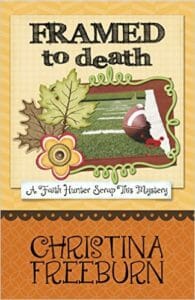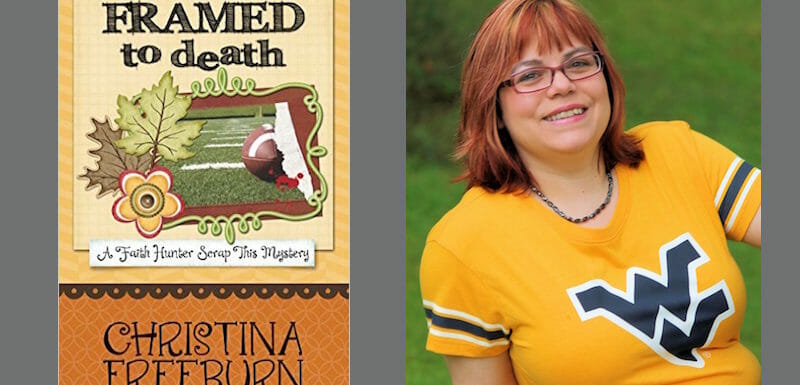 In ninth grade, Christina Freeburn and a friend collaborated to write a teen-romance novel. Freeburn says the book was hidden away years ago, but she’s continued writing. According to Freeburn, she’s always loved books, and she now has nine of her own. In Framed to Death, she poses the question—how can you bring a murderer to justice when a town prefers to hail the killer as a hero?
In ninth grade, Christina Freeburn and a friend collaborated to write a teen-romance novel. Freeburn says the book was hidden away years ago, but she’s continued writing. According to Freeburn, she’s always loved books, and she now has nine of her own. In Framed to Death, she poses the question—how can you bring a murderer to justice when a town prefers to hail the killer as a hero?
“I wanted to explore the issue of how right and wrong is decided based more on the person involved than the action itself. Over the last few years, I’ve noticed this happening in schools, churches, work, politics, and in Internet communities. I’ve had experience navigating through this attitude at a church, and with a coach at a high school, and was amazed that the adults involved were honest about how certain behaviors were overlooked when one child did them, but disciplined when another did the exact same thing.”
Freeburn also noticed the same attitude about societal privilege a few years earlier when synthetic marijuana was being marketed to teens as legal. “Law enforcement and other authorities were having a hard time explaining to teens that it was dangerous and not a safe way to get high. West Virginia ended up banning the product.”
I had to let him become the villain if it needed to happen. I hated throwing out my own guideline as I’m a rule-abider at heart…
With Framed to Death, Freeburn said she saw a way to address both these issues. “As high school football is huge in small towns, and brings out an equal amount of love and hate in the community—not to mention celebrity status—I felt it was the perfect backdrop to explore the drug issue and the who-over-what elements. Fortunately in my community there is more love than hate flowing for high school sports, and nothing murderous has ever occurred!”
Thus, the issue of “privilege” worked its way into Framed to Death. Freeburn’s protagonist is an amateur sleuth who’s never been charged with interfering in a police investigation. “I realized she had benefitted from the ‘who is more important than the what’ situation that bothered me in real life. Faith was born and raised in Eden, her grandmothers are well-loved and respected, she’s friends with an assistant prosecuting attorney and a detective, and never had any legal consequences for amateur sleuthing. How would she react if someone claimed she’s benefitted from favoritism? Would she agree?”
Framed to Death has been the hardest book Freeburn says she’s ever written. “I sure hope another one doesn’t compete with the title as I swore at times this book was going to break me. There were a lot of things contributing to it, but one of the biggest hurdles was facing down one of my I-will-never-write-this rules.
“Years ago, I decided I would never again have a ‘bad’ police officer in a novel. I can’t remember if it was because of backlash I received, or I felt it was an overdone character in novels, but I had made it a firm rule and stuck with it for over ten years: law enforcement personnel would not be evil-doers. With the plot elements in Framed to Death, it made sense for the story to have an officer who targeted my heroine and acted more than just annoyed at her sleuthing.”
Freeburn said she had to let go of her rule and allow the story to take shape. “I had to let him become the villain if it needed to happen. I hated throwing out my own guideline as I’m a rule-abider at heart, so giving up a long-standing rule was a huge fight. Fortunately, no one else was around while I argued it out. And for readers who’d like to know, I argue with myself in the manuscript as I’m typing it and also out loud.”
As an author, Freeburn tries to put part of herself in her books. For instance, her protagonist was once in JAG and is a scrapbooker, just like Freeburn. “But,” she said, “her nosiness with murders is all her.”
Every book and character relationship in Freeburn’s books has a theme song. “There’s just something about the having a theme song for the book that helps me stay centered on the emotions I want to portray. I’ve come to realize I’m an emotion-centered writer. I’ve always thought I was more of a plotter, so this question has helped me figure out what my stumbling block is for the current project I’m working on.”
In addition to writing, scrapbooking has become an integral part of Freeburn’s life. She said her most memorable project was the second vacation album she made for her mother-in-law as part of a Christmas gift.
Double Trouble Bonus Code: #Framed
“We vacation with her frequently and I had made her an album the previous year filled with pictures of her and her grandchildren enjoying the place we visited. I had read on a popular scrapbooking board how scrapbooks as gifts didn’t always go over well with the recipient, so I made it one part of her gift. I loved scrapbooking, so I was totally fine with me being the one to love it most. I had a good reason to sneak away and create—I was making a Christmas gift.
“The following year, my mother-in-law called to ask if I was making her another vacation album for Christmas. At first, my husband didn’t want to tell his mom and ruin the surprise, but she was insistent. She had to know. It was important. My husband finally admitted I was and his mom was thrilled. Each year her group of friends has a ‘who got the best gift from their kids’ competition, and last year my album helped her win. She knew a scrapbook handmade by her daughter-in-law would put her right back in the winner’s circle.”
Learn more about Christina Freeburn on her website at christinafreeburn.com.

Love the cozy mysteries and this one sounds like a hit
I agree with the scond paragraph 100%; sounds like I’d enjoy the book also!
Love it! Hope she wins this year! Can’t wait to read this book!